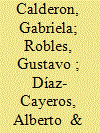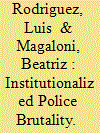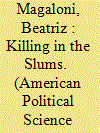|
|
|
Sort Order |
|
|
|
Items / Page
|
|
|
|
|
|
|
| Srl | Item |
| 1 |
ID:
142492


|
|
|
|
|
| Summary/Abstract |
In 2006, the Mexican government launched an aggressive campaign to weaken drug-trafficking organizations (DTOs). The security policies differed significantly from those of previous administrations in the use of a leadership strategy (the targeting for arrest of the highest levels or core leadership of criminal networks). While these strategies can play an important role in disrupting the targeted criminal organization, they can also have unintended consequences, increasing inter-cartel and intra-cartel fighting and fragmenting criminal organizations. What impact do captures of senior drug cartel members have on the dynamics of drug-related violence? Does it matter if governments target drug kingpins versus lower-ranked lieutenants? We analyze whether the captures or killings of kingpins and lieutenants have increased drug-related violence and whether the violence spills over spatially. To estimate effects that are credibly causal, we use different empirical strategies that combine difference-in-differences and synthetic control group methods. We find evidence that captures or killings of drug cartel leaders have exacerbating effects not only on DTO-related violence but also on homicides that affect the general population. Captures or killings of lieutenants, for their part, only seem to exacerbate violence in “strategic places” or municipalities located in the transportation network. While most of the effects on DTO-related violence are found in the first six months after a leader’s removal, effects on homicides affecting the rest of the population are more enduring, suggesting different mechanisms through which leadership neutralizations breed violence.
|
|
|
|
|
|
|
|
|
|
|
|
|
|
|
|
| 2 |
ID:
175276


|
|
|
|
|
| Summary/Abstract |
How can societies restrain their coercive institutions and transition to a more humane criminal justice system? We argue that two main factors explain why torture can persist as a generalized practice even in democratic societies: weak procedural protections and the militarization of policing, which introduces strategies, equipment, and mentality that treats criminal suspects as though they were enemies in wartime. Using a large survey of the Mexican prison population and leveraging the date and place of arrest, this paper provides causal evidence about how these two explanatory variables shape police brutality. Our paper offers a grim picture of the survival of authoritarian policing practices in democracies. It also provides novel evidence of the extent to which the abolition of inquisitorial criminal justice institutions—a remnant of colonial legacies and a common trend in the region—has worked to restrain police brutality.
|
|
|
|
|
|
|
|
|
|
|
|
|
|
|
|
| 3 |
ID:
172542


|
|
|
|
|
| Summary/Abstract |
State interventions against organized criminal groups (OCGs) sometimes work to improve security, but often exacerbate violence. To understand why, this article offers a theory about criminal governance in five types of criminal regimes—Insurgent, Bandit, Symbiotic, Predatory, and Split. These differ according to whether criminal groups confront or collude with state actors, abuse or cooperate with the community, and hold a monopoly or contest territory with rival OCGs. Police interventions in these criminal regimes pose different challenges and are associated with markedly different local security outcomes. We provide evidence of this theory by using a multimethod research design combining quasi-experimental statistical analyses, automated text analysis, extensive qualitative research, and a large-N survey in the context of Rio de Janeiro’s “Pacifying Police Units” (UPPs), which sought to reclaim control of the favelas from criminal organizations.
|
|
|
|
|
|
|
|
|
|
|
|
|
|
|
|
|
|
|
|
|